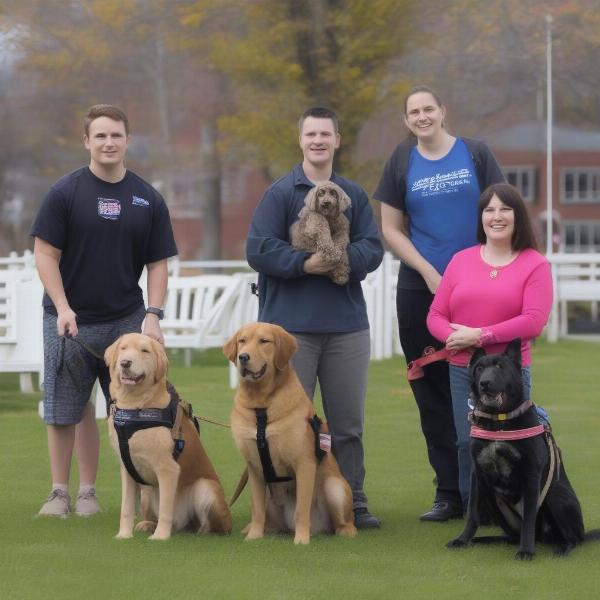Service dog training in Massachusetts is a specialized field requiring dedication, patience, and the right resources. Finding the right program is crucial for individuals seeking a well-trained service dog to assist them with their specific needs. This guide will provide you with a comprehensive overview of everything you need to know about service dog training in Massachusetts, from choosing a program to understanding the legal rights of service dog handlers.
Choosing the Right Service Dog Training Program in Massachusetts
Selecting a reputable training program is the first step towards a successful partnership with a service dog. Look for programs accredited by Assistance Dogs International (ADI) or other reputable organizations. These accreditations signify adherence to high training standards and ethical practices. Consider factors like the program’s specialization, training methods, and the length and structure of their programs.  Choosing a Service Dog Training Program in Massachusetts
Choosing a Service Dog Training Program in Massachusetts
Some programs focus on specific disabilities, such as training dogs for individuals with visual impairments or mobility issues. Others may offer a more generalized approach. Do your research to find a program that aligns with your individual requirements. Ask about their training philosophy, the types of dogs they work with, and the level of support provided after the initial training period.
Understanding the Laws Surrounding Service Dogs in Massachusetts
Massachusetts adheres to the Americans with Disabilities Act (ADA), which grants service dog handlers certain rights. Familiarize yourself with these rights to ensure you and your service dog are treated fairly in public spaces. For instance, businesses are generally required to allow service dogs to accompany their handlers, even if they have “no pets” policies. However, it’s important to remember that your service dog must be well-behaved and under your control at all times.
What are the access rights of service dog handlers in Massachusetts?
Service dog handlers in Massachusetts have the right to access most public spaces with their service dogs, including restaurants, stores, and transportation.
What are my responsibilities as a service dog handler?
As a handler, you’re responsible for your service dog’s behavior and cleanliness. Ensuring your dog is properly trained and well-behaved is crucial for maintaining these access rights.
The Service Dog Training Process
Service dog training is a comprehensive process that involves several stages, from basic obedience to specialized task training. Initially, dogs learn fundamental commands like sit, stay, and come. As they progress, they begin learning specific tasks tailored to their handler’s needs. This could include retrieving items, opening doors, providing balance support, or alerting to medical episodes. The training also includes extensive socialization to ensure the dog is comfortable and confident in various environments.
Finding Financial Assistance for Service Dog Training
The cost of service dog training can be substantial. Explore potential funding options, such as grants, scholarships, and fundraising platforms. Many organizations dedicated to assisting individuals with disabilities offer financial aid for service dog acquisition and training.
Conclusion
Acquiring a service dog in Massachusetts is a significant commitment. By carefully researching training programs, understanding your rights and responsibilities, and exploring funding opportunities, you can pave the way for a successful partnership with your service dog. Finding the right program, such as those found in Boston (service dog training boston), is a crucial step.
FAQ
- How long does service dog training take? Service dog training typically takes between 18-24 months, depending on the dog’s aptitude and the complexity of the tasks.
- What breeds are commonly used as service dogs? Labrador Retrievers, Golden Retrievers, and German Shepherds are popular choices due to their intelligence, temperament, and trainability.
- Can I train my own service dog? While it’s possible, it’s highly recommended to work with a professional training program to ensure the dog receives comprehensive and standardized training.
- Where can I find more information about service dog laws in Massachusetts? You can find detailed information on the Massachusetts Office on Disability website.
- Are service dogs allowed in all public places? Service dogs are generally allowed in most public places, but there are some exceptions, such as sterile environments in hospitals.
- What is the difference between a service dog and an emotional support animal? Service dogs are specifically trained to perform tasks for individuals with disabilities, while emotional support animals provide comfort and companionship but don’t have specific task training.
- How do I find reputable service dog trainers in Massachusetts? Start by checking with Assistance Dogs International (ADI) accredited programs.
You might also find our articles on dog-friendly establishments in Provincetown (dog friendly restaurants provincetown) and dog-friendly hotels in Hull, MA (dog friendly hotel hull ma) helpful. Our dog adoption form (dog adoption form) and information on dog grooming vans (dog grooming van) might also be of interest.
ILM Dog is your comprehensive resource for all things dog-related. From breed selection to health and wellness, training, nutrition, and even grooming, we offer expert advice and guidance to help you provide the best possible care for your canine companion. Our expertise also extends to products and accessories to enhance your dog’s life. Contact us at [email protected] or call us at +44 20-3965-8624 for any inquiries. Visit our website, ILM Dog, for a wealth of information and resources.